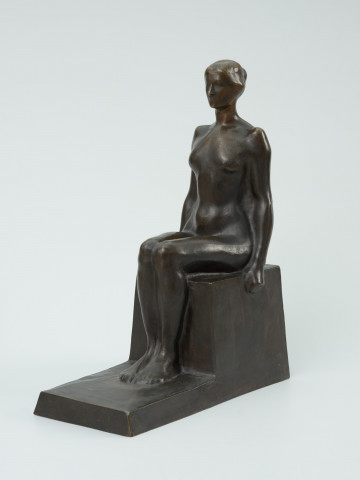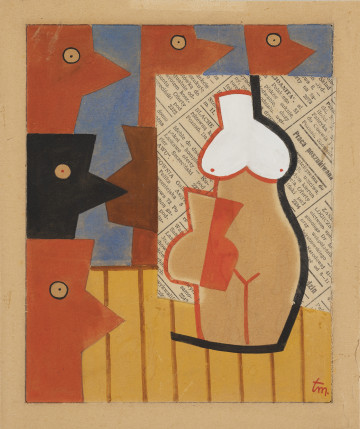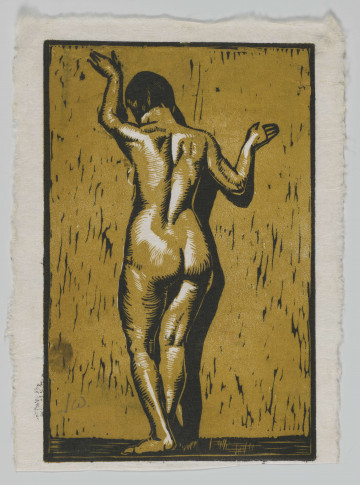
Idol. Sitting woman
1906
National Museum in Szczecin
Part of the collection: European classics of modernity
Thanks to the intercession of Józef Leski, Director of the Warsaw Museum of Industry and Agriculture, Edward Wittig received a scholarship enabling him to go to Paris in 1900. At the School of Fine Arts there, he enrolled in the atelier of the aged Hubert Ponscarme, and outside the Academy, he apprenticed in the workshop of his former pupil Alexandre Charpentier. However, influenced by the works of Auguste Rodin, Wittig decided to move to the atelier of the great innovator's disciples, Madeleine Jouvray and Lucien Schnegg. Thanks to them, he not only got to know Rodin, but also Antoine Bourdelle and Charles Despiau. From 1903 he took part in the Salon des Independents, the Spring Salon and the Autumn Salon. In the first decade of the 20th century, he produced a number of female nudes whose form evolved from the free, flowing lines of Art Nouveau to the compact, monumental and serene masses of New Classicism. The transitional phase was represented by a group of works with a clear layout, based on the contrast of clearly demarcated masses (Bożyszcze [The Idol], 1906; Wyzwanie [The Challenge], 1907; Kobieta [The Woman], 1908). In the nude Eve (1911), the marble version of which was placed in the Trocadéro in Paris, and the bronze cast in Warsaw's Ujazdowski Park, reminiscences of turn-of-the-century lyricism were still visible. The Autumn statuette (1913), in Szczecin's collection, clearly refers to Aristide Maillol's post-Dodin Pomona. The French artist, who repeatedly returned to the theme of a woman holding apples in her elbow-bent hands, made numerous versions of the orchard goddess during his lifetime. The first model was presented in 1910 during the Autumn Salon, and the sculpture eventually decorated the music salon in the Moscow Palace of Ivan Abramovich Morozov. To the same series belonged: Flora (with arms lowered), Wiosna [Spring] (touching her cleavage with her hands) and Lato [Summer] (with one arm lowered and the other bent at the elbow). Wittig equipped his version of Pomona with a large fruit basket, which the goddess holds above her head with both hands.
Szymon Piotr Kubiak
Author / creator
Dimensions
cały obiekt: height: 51 cm, width: 18 cm
Object type
sculpture
Creation time / dating
Creation / finding place
Identification number
Location / status

1906
National Museum in Szczecin

1949
National Museum in Szczecin

National Museum in Lublin
DISCOVER this TOPIC
National Museum in Szczecin
DISCOVER this PATH
Educational path